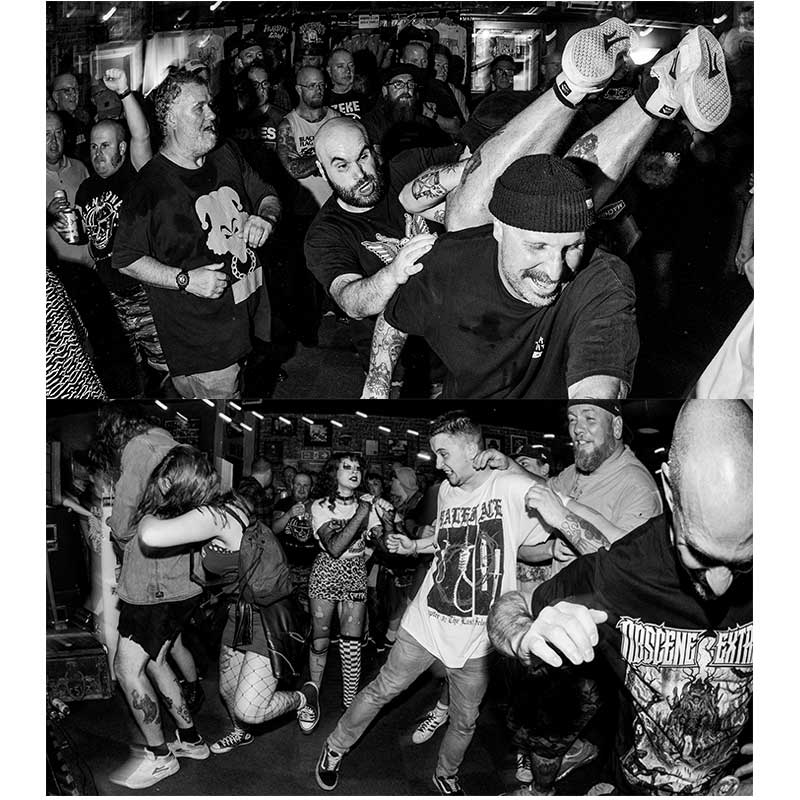From pithead to mosh pit: the working-class Welsh hardcore scene 24.11.23

Ben Jones draws on his experience of being in a hardcore punk band and interviews the owner of Newport’s The Cab venue to explore the long-standing egalitarian ethos of the hardcore scene within working-class Welsh culture. He argues why this is more important than ever as austerity bites deeper, and the scape-goating of minorities takes hold.
Features by masters students from the School of Journalism, Media and Culture (JOMEC) at Cardiff University, commissioned and published as part of our sponsorship partnership with JOMEC.


The crowd at Murphy’s Law at The Cab, Newport, 2023. Photographs © @vogonlaundromat (Instagram handle).
Wales’ deep history as the ‘land of song’. is something that often feels mystical or otherworldly; a divine power bestowed upon its creative population that is deep seated in its identity. This facet of Welsh identity has fostered a passionate national relationship with music throughout history: from pre-Acts of Union folk music, to twentieth-century male voice choirs, right through to Cool Cymru of the 1990s and early 2000s, and now the increasing global popularity of Welsh-language indie, rock and hip hop (dubbed by some ‘Cŵl Cymru 2.0’).
It’s perhaps because of this heavily emotive, often ethereal relationship with music that it has also been used as a powerful cultural tool and means to navigate and challenge Welsh realities. Famously, Dafydd Iwan’s 1983 folk song ‘Yma O Hyd’ documented the singer’s demoralisation with the political reality he saw his nation in at the time; with the rejection of a devolved Welsh government in a 1979 referendum, the political ideology of Conservative Prime Minister Margaret Thatcher, and the lead-up to the 1984 Miners’ Strike.
I’ve always felt a connection to music as a major part of my Welsh identity. I grew up in Caerphilly, so I’ve always had places to experience live music on my doorstep in neighbouring cities Cardiff and Newport. Yet in my early teens I never felt I belonged to any particular local music community or culture where the live experience felt like a response to navigating my own reality.
Around age fifteen I discovered hardcore punk and it changed my involvement with Welsh music completely. This scene first emerged in the US in the late 1970s and combined egalitarian politics, and an anti-corporate, mutually supportive ethos with a particularly hard, fast and aggressive sound. I started attending shows across south Wales, and eventually formed a band with my mates and played shows as well as becoming an active member of the local hardcore scene; a facet of the wider Welsh punk scene that was years in the making. Gigs would often feature a mixture of local and international bands who shared the hardcore punk outlook towards performance, creating a live energy that encouraged stage-diving and slam-dancing as a cathartic response to daily realities.
After a few years of heavy involvement in the Welsh hardcore scene, my high school hardcore band broke up and I started university, and although I stayed local in Cardiff, I gradually found myself less and less involved with live hardcore. In my early twenties the Covid-19 pandemic happened, and as a Type 1 diabetic I lived in fear of what the future of social interaction, especially live gigs, meant as a long-term health sufferer. Post-pandemic, I’ve gradually been able to revisit a part of my Welsh identity I never knew I missed so much: live hardcore music. Attending this year’s Outbreak Festival in Manchester, the UK’s biggest celebration of hardcore music, it was enthralling to see the genre not only experiencing a timely ‘renaissance’, with clusters of bands from so many post-industrial communities of the UK and worldwide, but also evolving into a space for more than just White, working-class men.
The south Wales scene today
The tight knit south Wales hardcore scene is thriving as a space for navigating and challenging realities of modern Wales, where people can experience the escapist release and energy of the live hardcore experience. For those searching for community and identity in an increasingly divided United Kingdom, it’s something that is perhaps more crucial than ever.
I recently visited The Cab, a venue in Newport that has become the beating heart of south Wales hardcore, to speak to its owner Joe Wag about local hardcore in 2023. The spot was born out of hardcore music and community project work, a combination that often goes hand-in-hand. Joe has been putting on hardcore and punk shows across south Wales venues under CHF Promotions for years, serving a burgeoning scene without a dedicated main hub, at the same time as running his family’s business Reality Theatre – a working-class arts and theatre community company – mainly worked out of pubs and different office and studio spaces. When the city centre venue came up for sale on auction, it was fated.
‘The reason we could afford it was because it was a two storey derelict weed farm with holes in the walls!’ Joe joked. After months of work doing up the venue alongside ongoing hardcore shows and community work, he feels the space is reaching its full potential, and the local scene is healthier than ever.
One thing Joe noted had been lacking from the scene is local bands; bands from elsewhere in the UK, particularly the north of England, would often open shows. But today there’s no shortage of Welsh hardcore. ‘In a minute, we’ll probably have eight to ten proper Newport or Cardiff based bands,’ Joe predicted excitedly. Among numerous groups Joe hailed the return of Rancour, as well as Asidhara, and newcomers Violent Offence, as the future of the local scene.
‘I think the scene’s grown, but not only that, I genuinely think it’s because we’re in one of the worst political moments in south Wales history,’ Joe said. ‘People are more divided than ever and people are skint.’ Hardcore punk’s ethos as an aggressive reaction to the climate of the time is something that hasn’t faded over time, and indeed with inequality growing and the scape-goating of minorities and women increasing, especially online, the scene is needed more than ever.
An ‘all in the same boat mentality’ connects the people and bands who use The Cab to enjoy hardcore. ‘We’ve had bands from Canada, Australia, Columbia, the States,’ Joe said. ‘You find all these bands come from situations that make them angry, whether they’re political or not. They started out as a bunch of kids who are pissed off at something.’
The south Wales hardcore scene provides people with a space where they can not only put daily struggles behind them, but also actively participate in the local community. The Cab’s hardcore shows in Newport have blended the two to foster a passionate and dedicated Welsh scene.
‘I think the link is working-class issues. [In the past] I’ve done a fundraiser for setting up a food bank. You put up a post online saying: “Who wants to come play the gig?” and the first people and only people in there are punks and hardcore bands.’
For those discovering hardcore in modern south Wales, the music community that The Cab fosters can provide a euphoric catharsis against all that’s wrong with the world, just as the scene was for myself and Joe ten years ago.
‘[Today] you’re conditioned to stare at your screen and look like other people, and do what’s popular and what’s cool,’ Joe says. ‘I think a lot of the kids rolling through now have just found somewhere to put all that in the fucking bin.’

About the author
Ben Jones is a writer and MA Magazine Journalism graduate from Cardiff University with an interest in music, culture and Welsh identity in the modern world.
Further articles from Planet Platform:
Faith Clarke
‘I’m not lazy like those people’: How austerity rations our compassion
Elizabeth Facer
Reflections from the Wales Coast Path: Penrhyndeudraeth to Harlech
Laura Stevens
Dock to Dock: The Cardiff Bay Barrage
Natalie Cox
Retracing Wales | Discover the Shape of a Nation